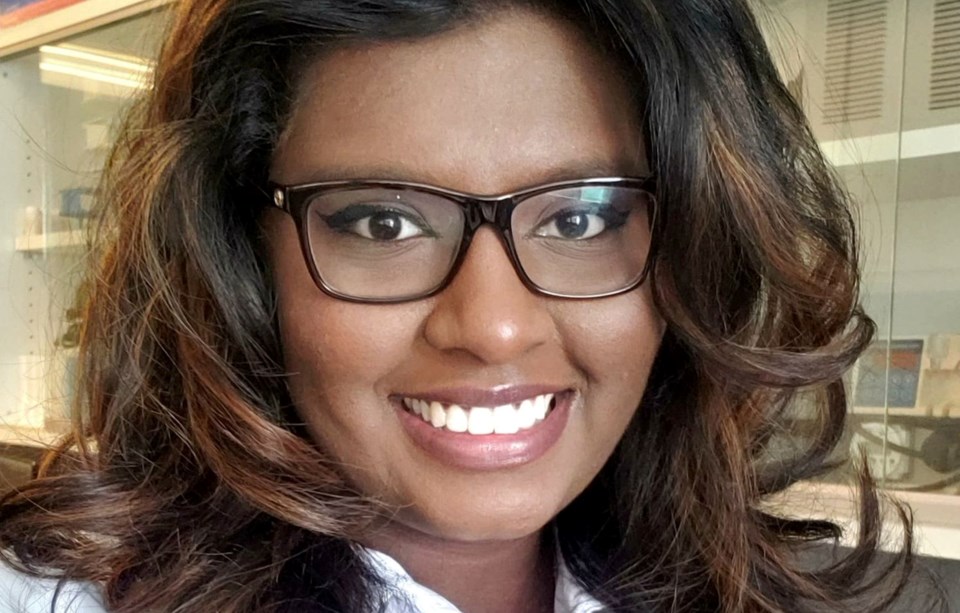An Algoma University assistant professor, along with a team of scientists, has found a way to regrow legs on frogs that could one day be used on humans.
The new scientific study garnered worldwide attention for the giant leap it makes for regenerative medicine.
“It is exciting to see that this is happening, that this is a possibility and know great treatments can potentially come out of this,” said Dr. Nirosha Murugan.
Murugan is the lead author of the study which appeared in the journal Science Advances last week. She has been busy giving interviews to news outlets around the world, including The New York Times.
It even appeared as a news item on The Late Show With Stephen Colbert.
The comedian poked fun at the scientists, who used African clawed frogs, saying, “Clearly, they’ve created Frog Wolverine,” and that a team of frog X-Men can finally be assembled.
Murugan assures that’s not the case and says frogs were used because the goal of the study was to initiate a process of regeneration in an organism that can’t do that.
“Frogs are unique in the sense that when they are in their earlier developmental stage as tadpoles, they can fully regenerate. They can lose a tail or eye or whatever organ and fully regenerate it. But when they become an adult frog, they completely lose that ability,” she said.
“It’s similar to humans in a sense that when we are in an embryonic stage where we have a whole lot of stem cells, we do have regenerative capacity but in our adulthood we do not.”
For the experiment, the team used a silicone cap called a BioDome and placed that over the wound where the frog’s leg was amputated. The BioDome was filled with a silk hydrogel which was infused with a mixture of five drugs that when combined was hoped to provide a rebuilding opportunity.
One hindlimb was amputated from 115 frogs that were divided into three groups – one group with no treatment, another wearing the BioDome for 24 hours but with no medication, and the other with the BioDome for 24 hours and the drug mixture.
It didn’t take long for the researchers to get their first indication that the experiment was going as hoped.
“Within two weeks we noticed the wound itself didn’t completely close off in the treated animals. The wound stayed open but healed which facilitated the process for a leg to come out,” said Murugan.
Within 18 months, the legs regrew with nerves, muscles, bones and even toe-like features.
Some were missing features like toenails and webbing, but Murugan was happy with the results with just a single 24-hour treatment.
“In my opinion, it’s not perfect in its geometry but it’s really close,” she said.
Murugan, 31, has been an assistant professor at Algoma University for the past two years. She is an interdisciplinary scientist, and her areas of expertise are in neuroscience, regenerative medicine and cancer biology.
She grew up in Toronto and made her way north to Sudbury to attend Laurentian University where she received her bachelor’s degree in behavioural neuroscience, a master’s degree in neuroscience and her PhD in biomolecular science.
Murugan went to Boston to complete her postdoctoral at Tufts and then returned to Sudbury to open a research lab.
She can’t see herself anywhere but in Northern Ontario, now calling Sault Ste. Marie home.
She prefers learning and teaching in a close-knit community and appreciates that her research can help the residents where she lives.
“My research is centered around cancer and unfortunately, Sault Ste. Marie has one of the highest cancer rates in Ontario, so I feel with my research I can do a lot here,” she said.
Murugan, along with Dr. Ioannis Voutsadakis, an oncologist at Sault Area Hospital, will be starting clinical trials on a study Murugan completed last year on a side effect of cancer treatment known as “chemo brain”. Patients with chemo brain experience symptoms like fogginess, memory loss, depression or anxiety.
The purpose was to develop a tool to diagnose this before it occurs and to be able to start treatment earlier.
Murugan’s work does not go unnoticed.
Just last week, she was awarded the minister of colleges and universities’ rising star award of excellence for her innovative research and excellence in teaching.
“I’m really humbled by it,” Murugan said.
“To be recognized as a rising star for me, it’s like a beacon of hope for other people who are taking potentially unconventional approaches in their career, and I want to use it as a platform to share motivation with others.”
